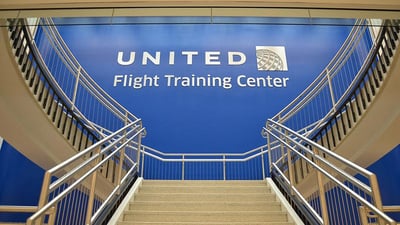Becoming a pilot for a major airline like United Airlines is a dream for many young pilots. This comprehensive guide will walk you through the necessary steps, requirements, and programs to achieve this goal, ensuring you're well-prepared for a successful career in the skies. Discover the career paths, training programs, salary expectations, and more to set yourself on the right track.

Five Steps to Becoming a United Pilot
Step 1: Get Your Private Pilot's License (PPL)
The Private Pilot's License (PPL) is the foundational certification for any aspiring pilot. Obtaining a PPL involves completing a specific number of flight training hours, passing a written exam, and successfully completing a practical flight test. It is also essential to secure an FAA Class 1 Medical Certificate to ensure you meet the health standards required for a commercial pilot career. The PPL provides the basic skills and knowledge needed to progress to more advanced certifications.
Step 2: Earn Your Instrument Rating (IR), Commercial Pilot's License (CPL), and Certified Flight Instructor (CFI) Ratings
After obtaining your PPL, the next step is to earn your Instrument Rating (IR), Commercial Pilot's License (CPL), and Certified Flight Instructor (CFI) ratings, at a flight training center like Flex Air. Each of these certifications requires passing written and practical tests, as well as meeting additional flight hour requirements set by the Federal Aviation Administration (FAA). The IR allows you to fly in various weather conditions, the CPL enables you to be paid for your flying services, and the CFI rating allows you to instruct other pilots, which is a valuable way to build flight time.
Step 3: Build Time as a CFI
Building flight time is crucial for advancing your pilot career. Working as a Certified Flight Instructor (CFI) offers an excellent opportunity to gain valuable flight experience while teaching others at a flight school. This role not only helps you accumulate the necessary flight hours but also provides industry exposure and networking opportunities that can be beneficial for your future career, including travel privileges.
Step 4: Land a Job at a Regional Airline and Obtain an ATP Certificate
Transitioning from a CFI to a regional airline pilot is an important step toward becoming a United Airlines pilot. Regional airlines provide the opportunity to gain significant flight experience and earn your Airline Transport Pilot (ATP) certificate, which is a requirement for flying for major airlines like United. Obtaining an ATP certificate involves passing a rigorous written and practical exam and building a substantial amount of flight time and experience.
Step 5: Apply to United Airlines
With your ATP certificate and experience at a regional airline, you can start applying to United Airlines. Preparing a standout resume and cover letter tailored to United is crucial. Highlight your qualifications, experience, and passion for aviation. Additionally, networking and developing strong soft skills can significantly enhance your chances of securing a position. Be prepared for a rigorous interview process that assesses your technical abilities and fit with United's culture.
Certification Hiring Requirements for United Airlines Pilots
Necessary Certifications and Licenses
To become a pilot at United Airlines, you must hold specific certifications and licenses. These include:
- An unrestricted FAA Airline Transport Pilot (ATP) certificate with an airplane multiengine class rating.
- A current FAA first-class medical certificate.
- An FCC Restricted Radiotelephone Operator Permit.
Obtaining and maintaining these certifications is essential for meeting United's hiring requirements and ensuring you are qualified to operate their aircraft safely.
Flight Time Requirements to Fly for United
Minimum Hours Needed
United Airlines has specific flight hour requirements for pilot applicants. You need a minimum of 1,500 flight hours, with 1,000 hours preferred in fixed-wing turbine aircraft. Additionally, having at least 100 hours of flight time within the last 12 months is advantageous. These requirements ensure that pilots have the necessary experience and recent flight activity to handle the responsibilities of a commercial airline pilot.
General Employment Requirements
Legal and Personal Qualifications
In addition to flight time and certification requirements, United Airlines has several general employment criteria:
- A valid passport with at least six months remaining.
- Legal authorization to work in the United States without sponsorship.
- The ability to travel freely to all countries where United operates.
- A high school diploma or GED, with a bachelor's degree preferred.
- Proof of COVID-19 vaccination and, if applicable, an International Certificate of Vaccination for Yellow Fever.
Meeting these requirements ensures you are eligible to work for United and can operate on their international routes.
Tips for a Successful First Officer Application
Preparing Your Application
Crafting a standout resume and cover letter is vital for a successful application to United Airlines. Tailor your application materials to highlight your relevant experience, certifications, and passion for aviation and the United Flight Deck. Clearly articulate why you are an excellent fit for United and how your skills align with their values and operational needs.
Networking and Professional Development
Building a strong professional network is essential for advancing your aviation career. Attend industry events, join professional organizations, and seek mentorship opportunities to connect with experienced pilots and industry professionals. Continuous professional development through additional training, certifications, and staying updated on industry trends will enhance your qualifications and make you a more attractive candidate.
Flex Air Career Pilot Program
Preparing for Success from Day One
The Flex Air Pilot Pathway program is designed to prepare aspiring pilots for successful careers from the very beginning of their training. The program includes practice interviews and personality assessments to help students develop the skills needed to succeed in the highly competitive aviation industry. Early preparation ensures you are ready to meet the challenges of the application process and excel in your pilot career.
Importance of Networking and Soft Skills
Networking and soft skills are critical components of a successful aviation career. Developing these skills throughout your training and career will enhance your ability to build professional relationships, communicate effectively, and navigate the complexities of the aviation industry. The Flex Air Pilot Pathway program emphasizes the importance of these skills, preparing you to succeed both in the cockpit and in your interactions with colleagues and passengers, potentially leading to a United First Officer position.
Conclusion
Key Takeaways
- Becoming a pilot for United Airlines involves a series of structured steps, including obtaining necessary certifications, building flight time, and gaining experience at regional airlines.
- Meeting United's flight time and certification requirements is essential, as is preparing a standout application and developing strong networking and soft skills.
- Programs like the United Aviate and Flex Air Pilot Pathway provide valuable support and guidance for aspiring pilots, helping them navigate the path to a successful aviation career.
- Dedication, continuous improvement, and a proactive approach to professional development are key to achieving your goal of becoming a United Airlines pilot.
Embarking on a career as a United Airlines pilot is a challenging but rewarding journey. By following the outlined steps and leveraging available resources, you can set yourself on the path to success and achieve your dream of flying for one of the world's leading airlines
Good luck on your journey to becoming a pilot for United! Alternately you might consider becoming a pilot at American Airlines.

